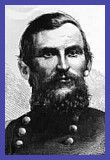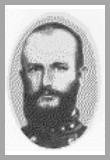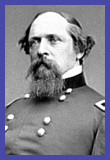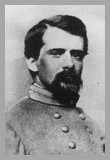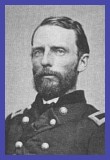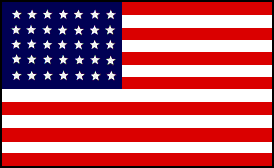93rd. at Cedar Creek

PHOTOS OF MOST OF THE GENERALS INVOLVED
AT
CEDAR CREEK ARE AT THE BOTTOM OF THE PAGE.

|
The battle of Cedar Creek was certainly, from a Federal standpoint, a decided victory. and one from which the Rebels were never able to recover. Within 90 days or more Early suffered defeat in two heavy battles and went whirling up the Shenandoah Valley before Gen. Sheridan's all conquering battalions which advanced as far as Stauton, the key to the valley. The turnpike from Winchester to Cedar Creek is One of the finest macadamized roads in the world, smooth as an asphalt pavement, walled in by tall hedges and limestone walls, bathed in the morning sunlight it looks like polished silver and has been made famous in song and story through "Sheridan's Ride" On the day of the battle of Cedar Creek.
| |

|
The Regiment lay in camp with the Sixth Corps, in reserve, the Eighth and Nineteenth Corps, occupying the front line. The first warning we had of the coming battle was the noise made by the attack upon these corps at early dawn, and seeing fleeing troops passing through our camp, hatless, without guns or accoutrements, riderless horses, and all the evidences of a stampede of an army surprised and routed. The Regiment was quickly formed and with the Second Division, Sixth Corps. at about 6.30 in the morning, forward across a small stream, Meadow Run, in front of the camp, ascended a slight elevation and awaited the passing through our line of battle the fleeing troops.
| |

|
The first attack made upon the Union lines was at two o'clock in the morning upon Custer's and Averill's cavalry, who were posted on the right and left respectively of the army. At four o'clock, the attack was made on the Eighth and Nineteenth Corps, and then we were convinced that a battle was in progress. Gen. Sheridan before leaving his army, had placed the Eighth Corps on the left, Nineteenth Corps in the centre and the Sixth Corps under Gen. Wright, on the right and rear, with cavalry on the flanks.
| |

|
Gen. Sheridan left for Washington on the 15th and on the l6th received a dispatch that Longstreet was on his way from Petersburg to join Early which was obtained through the interpretation of Rebel signals. On the 17th Sheridan had finished his conference and returned as far as Martinsburg and on the 15th reached Winchester on horseback, where he remained for the night. During his absence Gen. Wright of the Sixth Corps was left in comand and of the army.
| |

|
Gen. Early's maneuvering of his army in the early morn of the battle was worthy of Napoleon. In the gray dawn of the morning, while the fog was hanging heavily over the armies, Gen. Early sent General Rosser with his Division of cavalry to strike our extreme right, held by Gen. Custer, and the First and Third Division, Sixth Corps pickets which they did quite vigorously at 4 A.M. Gen. Gordon also struck our pickets on the extreme right, but the pickets in front of Gen. Custer, or Nineteenth Corps, gave no alarm, anal Gen. Early,with Gen. Wharton's Division and the artillery,
some distance in the rear, near Strasburg, advanced to Hupp's Hill, an hour before and waited inside of our picket lines an hour, awaiting the attacks on the flanks of our army.
| |

|
At 4 o'clock the pickets of our Sixth Corps were driven in, while a rattling fire of musketry was kept up, when Gen. Early advanced in three columns. Gen. Crook's Eighth Corps was enveloped by the Rebel Divisions of Gens. Kershaw, Ramseur, Pegram and Gordon, and at the same time Gen. Wharton's advanced against the Nineteenth Corps. Gen. Crook was overwhelmed and his Corps scattered, but at the Camp of the Nineteenth Corps, Gen. Grover's Division stood at arms.
| |

|
Generals Wright and Emory formed a line of defense and awaiting the advance of Kershaw, who was in Gen. Crook's camp pursuing the fleeing soldiers. In the meantime Gen. Gordon and Pegram had passed around Gen. Crook and deflecting struck the Nineteenth Corps on the flank, being sheltered from view by the heavy fog that hung over the valley. The Rebel artillery at once enfiladed the Nineteenth Corps, and Gen. Wright ordered it to retire. By this time Gen. Crook had lost 1,300 men, with all the camp equipage and wagons.
| |

|
General Ricketts, who commanded the Sixth Corps, promptly ordered the Sixth Corps from its camp in the rear, and Gen. Early's advance was checked. Gen. Riekett's was wounded at this point and Gen. Getty took the Second Division, Sixth Corps, and at once formed a line across the Winchester pike, with batteries planted to command the roads down the valley. The Vermont Brigade skirmishers made a counter charge, but were checked by the Rebel artillery.
| |

|
Our Second Division held the new line and was posted on the edge of an open oak grove. Gen. Grant, of the Vermont Brigade, was in charge of our Division. In this way the Second Division awaited the onslaught of Gen. Early's victorious columns, which were driving the shattered and disorganized fragments of the Eighth and Nineteenth Corps wildly through our ranks.
| |

|
Gen. Early says he sent Genral Wharton forward from Hupp's Hill in front of the Nineteenth Corps intrenchments and the Union forces fled without resistance, and lost all its camp equipage, ete." Gen. Wright was present with the Nineteenth Corps when it was whipped, and having been wounded in his efforts to rally the men, he at once abandoned that Corps and rejoined his Sixth Corps. The Nineteenth Corps had only one General officer wounded, Gen. Grover, who succeeded in rallying his division, while the Sixth Corps had Gens. Riekett's, Getty and Wright and others wounded and Gen. Bidwell killed.
| |

|
The Sixth Corps numbered less than twelve thousand men, and the Second Division had confronted Gen. Early's entire army of more than twenty thousand men, who flushed with victory, had brought up their guns and twenty of our guns. Which they had captured, and rushed upon our lines with those wild exultant yells, the terror of which can never be conceived by those who have not heard them on the field. The attack was simultaneous along the whole line of the Second Division of the Sixth Corps. It was like the clash of steel to steel. The victorious columns were checked as they had found an immovable obstacle to their continued march to victory.
| |

|
Our Second Division was on the left, nearest to the pike and had received the entire shock of the attack, while Gen. Bidwell's Brigade, which held the extreme left, and the key to the pike, had sustained the attack of the whole of Kershaw's rebel Division. which came up in compact order to within very close range. That Rebels being checked, Gen. Bidsvell ordered his Brigade to charge, and Gen. Bidwell was killed. The line was quickly reformed in the position from which the charge was made, and again the rebels came on with cheers and yells. They were as bravely met as before and a second counter-charge sent them again in disorder across the creek, leaving the ground covered with their dead and wounded.
| |

|
A third time Gen. Eearly s forces came on, but with less spirit, for they had been informend that the Sixth Corps had been sent to Washington on its way to Petersburg, and having discovered the mistake. all of Gen. Early's authority was insufficient to bring them up to a spirited charge. The Second Division of the Sixth Corps had repulsed them three times with terrible loss, as well as to our own. Gen. Early having manned the 40 guns he had brought with him, together with most of the 24 he had captured in the morning. Gen. Early had twenty thousand and his line overlaped ours. Gen. Early finding he could not drive us, sent Gen. Gordon on the right flank of our Second Division, which compelled us to fall back ! by order of Gen. Wright, and Gen. Getty formed the Second Division of the Sixth corps in a more commanding position.
| |

|
Brigadier General Warner was in command of our Brigade, and at 10 oclock the new position was formed north of Aliddletown, two miles in rear of the position held by our Second Division of our Corps early in the morning. The 93rd went leisurely to its next position, captain Eckman, Hean and the, writer stopping on the way, as Captain Eckman had been wounded, and gave assistance to him. We had not lost anything. All of the wounded were taken along and formed in the same position as in the morning. Secord Division on the left, First in the center and Third on the right. The position of the 93rd was facing a wood. The Nineteenth Corps had by this time been rallied and was massed on our right and rear with cavalry on our flanks.
| |

|
Gen. Wright had decided that from here the Rebels were to be driven back across Cedar Creek. Their career of victory was ended, and the grand old Sixth Corps had turned the fortunes of the day. while in course of preparation for this advance cheers were heard on our left, loud and long, when suddenly Gen. Sheridan was seen speeding up the valley pike. When he reached the line of battle he inquired: "What troops are those?" "The Sixth Corps," was the response. And as he swung his hat and dashed along the line, he shouted:
| |

|
"We are all right. Never mind, boys: We'll whip them yet; we'll whip them yet! We Shall Sleep in our old quarters tonight. "
| |

|
In passing the 93rd at full speed, his black steed "Rienzi" was covered with foam and dirt, and the men leaped in the air, shouted and cheered in wildest joy.
| |

|
Gen. Sheridan gave a thorough examination of his line of battle and when everything was ready at 4 P.M. the line advanced, with the Second Division of the Sixth corps as the pivot, the 93rd passing through the wood to a stone wall to the edge of it, while Lt. Col. Keller and the writer were the first to leap, and the charge continued, which ended in a glorious victory. The Rebels had made a charge at one o'clock on the right of our line, but were repulsed after a brisk fire of artillery. As Gen. Sheridan gave the orders to advance, the Third division on our right, passing through a wood under a heavy fire, the first Division moving firmly. and our Second Division was ordered to go slow, but forced the Rebels back.
| |

|
Our second and Third Divisions captured the stone wall, and in their front was a meadow and a gradually inclined plane and behind a wall which skirted the crest was the Rebel line. Directly in front of our Second Division stood a brick mill, from the windows of the mill the Rebel sharpshooters picked off our men. The galling fire from the Rebel line of battle and sharpshooters, retarded our advance, when a charge was made, when the whole Rebel line gave way, and the three divisions of the Sixth Corps bounded forward, and then commenced the wildest race that had ever been witnessed, even in that valley. The Rebel lines were completely broken and in utmost confusion, every Rebel was going in greatest haste toward Cedar Creek. The chase was followed up regardless of order for three miles, on an open plain, our men charging batteries with empty muskets, seizing prisoners by the hundreds, every Union soldier his own commander, bent on nothing but the destruction of the 'dying foe. Gen. Sheridan was in our midst, shouting: "Now give it to-them, boys!" and hammer and tongs the cannons belched forth their red charges of death, and like the roll of 100,000 drums the musketry of our advancing and victorious soldiers echoed along the Shenandoah until the Potomac, catching up the refrain, it was carried into "Father Abraham's" bosom at Washington,the beautiful music of victory.
| |

|
Gen. Early's troops fought desperately, but Kershaw's column broke, and Rhodes, Gordon and other divisions were shattered and sent helterskelter across Cedar Creek. When we reached Cedar Creek Gen. Custer took up the fight, shouting "Charge them ! Charge them !" driving them steadily up the steep ascent on the south bank of Cedar Creek, and as night had now approached, the charging column of our cavalry lit up the darkness with thousands of lights sent forth from their carbines, and the pursuit was continued until Mount Jackson was reached.
| |

|
Gen. Custer caused a stampede among the Rebels, and cannon, caissons, ambulances, wagons and packed animals were caught at Strasburg, being unable to cross over the narrow bridge. In this charge 48 pieces of Rebel artillery, with 1, 200 prisoners, caissons, ambulances, wagons, etc., were captured. Gen. Merritt captured seven guns and 24 guns captured from the Union army in the morning were recaptured. Gen. Ramseur of the Rebel forces was mortally wounded and died in the ambulance which was recaptured. The next morning all the captured and recaptured guns, etc., were parked in front of Gen. Sheridan's headquarters, some 83 pieces, and these trophies were viewed by hundreds of soldiers Our army was victorious, and the honor of the Sixth Corps was saved,and the 93rd thus ended the largest day's work it had ever performed before.
| |

|
Gen. Sheridan's magnetism and dash, together with his former successes had a great deal to do with this victory. It is, however, hardly probable, that Early would have made much further progress against Gen. Wright's line for a charge had been contemplated when Sheridan appeared upon the scene.
| |
 "Season's have passed since that day and year;
"Season's have passed since that day and year;
Again o'er it's pebbles the brook runs clear;
And the field in a richer green is drest,
Where the dead of a terrible conflict rests."

HERE ARE PHOTOS OF SOME OF THE
GENERALS AT CEDAR CREEK
|
THE NAMES OF THESE GENERALS ARE AS FOLLOWS~LEFT TO RIGHT
|
|
EARLY~SHERIDAN~WRIGHT~MERRITT |


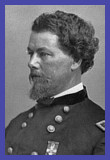
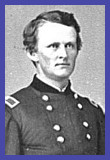
|
THE NAMES OF THESE GENERALS ARE AS FOLLOWS~LEFT TO RIGHT
|
|
ROSSER~CUSTER~GORDON~KERSHAW |
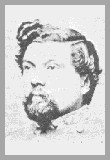

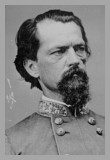
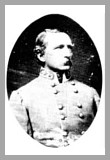
|
THE NAMES OF THESE GENERALS ARE AS FOLLOWS~LEFT TO RIGHT
|
|
CROOK~RAMSEUR~RICKETTS~PEGRAM |
